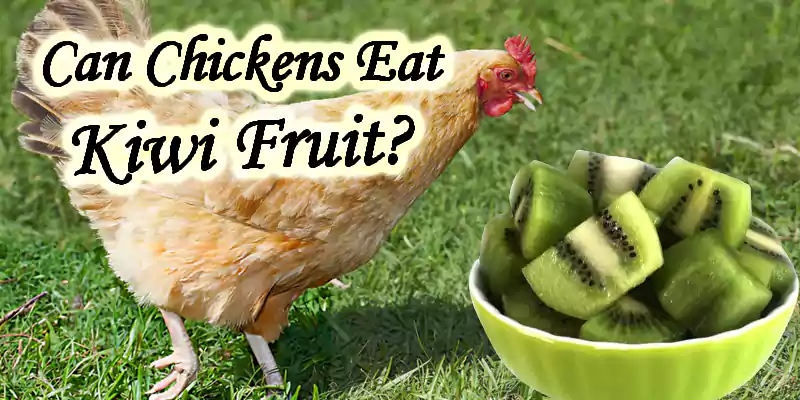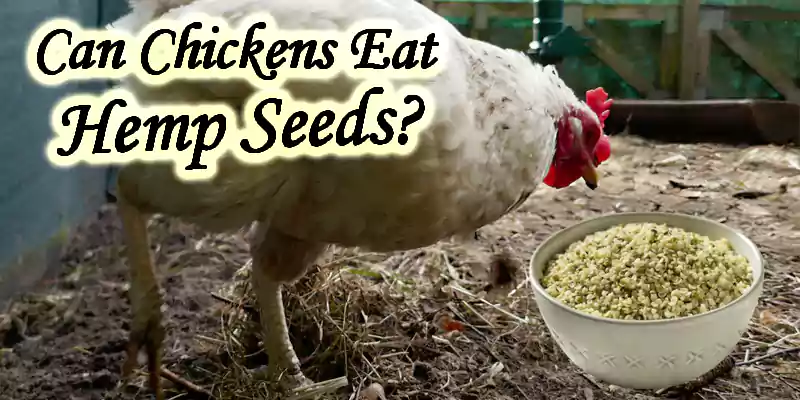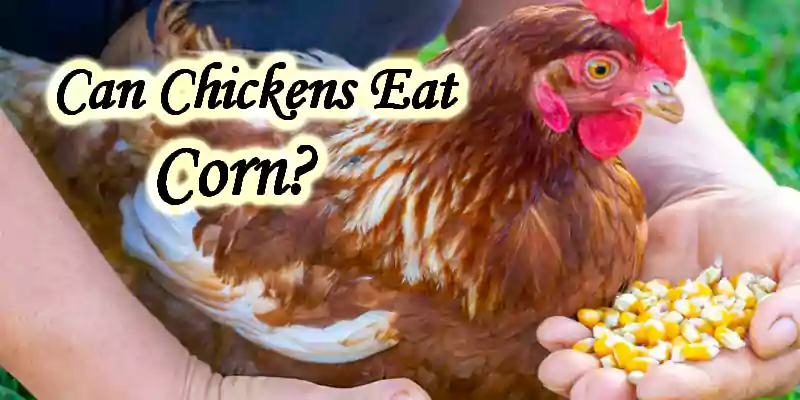Can Chickens Eat Kiwi? Nourish Your Flock with This Fruit!
Published: 23 Nov 2024
Chicken enthusiasts with the mindset to provide a varied diet to the flock are curious whether to serve Kiwi fruit or not. This is because they are not well aware of the risks or outcomes. Clucking birds should have a well-balanced diet for their optimal growth and vitality. Kiwi fruit is a nutrient-rich diet with several health benefits as an occasional diet for chickens. But is it safe for the flock? It needs more than a general perspective.
Understanding its benefits and risks is essential to evaluate its consequences for the flock. Learning how to prepare and serve it to our flock will make it a safe treat. So, let’s peel back the layers and explore the helpful knowledge about serving Chinese gooseberry.

Can Chickens Eat Kiwi? Nourish Your Flock with This Fruit!
Is it Safe for Chickens to Eat Kiwi?
Yes, the fruit is safe in moderation. Chinese gooseberry contains vitamins and antioxidants, which are helpful for the healthy growth. The flock loves the tender it’s flesh. However, it should be served to as a supplement and never replace the primary diet. The fruit has a high sugar content, which is unsafe for if served excessively. So, a fresh and moderate serving of this fruit is safe for chickens.
Nutritional Value of Kiwi?
Chickens need certain nutrients for their growth and to perform physical activities. It is good to know the nutrients available in the fruit. Here is a brief overview of the nutrients available:
- Vitamin C: Kiwi fruit is packed with vitamin C, which enhances their immune system. It is helpful during molting process, stress, and extreme weather. Vitamin C is an antioxidant agent.
- Vitamin K: Vitamin K is supportive of blood clotting. It helps to strengthen the bones of chickens. It supports the absorption of calcium minerals and produces strong eggshells.
- Dietary Fiber: Fiber content helps improve digestion system. It improves the gut health and prevents constipation issues. This fruit contains reasonable amounts of fiber content, which is good for the well-being.
- Potassium: It provides a decent value of potassium content which supports the nerve functions. It helps maintain electrolyte balance. It has a reasonable volume of Potassium.
- Antioxidants: Fruits offer a variety of antioxidants like flavonoids and carotenoids. These compounds provide aid in reducing oxidative stress. It is crucial while dealing with cellular damage.
- Natural Sugar: The fruits provide a quick energy boost with their sugar content. It supports in performing physical activities. Excessive sugar content is not recommended for chickens due to obesity.
- Low calories: This fruit is a low-calorie diet. It will help to maintain weight balance and prevent obesity issues. Poultry experts prefer low-calorie diets for their flock to stay fit and healthy.
How to Feed Kiwis to Chickens?
Every chicken owner wants to make it an enjoyable and nutritious treat for the flock. To achieve this goal, follow the step-by-step guide:
Select Fresh and Ripe Kiwis: It is essential to choose fresh food for the flock. Old or moldy fruit can cause digestive upset. Unripe Kiwis are complex and challenging to peck for chicks. Overripe diet are overly soft and not suitable for the flock.
Wash the Fruit: There are chances of dirt, dust, and pesticides on them, which are harmful to chickens. Therefore, we recommend a proper decontamination of the them. Dirty feed can cause digestive upset like diarrhea.
Cut them into Manageable Pieces: Serving whole fruit is not recommended due to the potential risk of choking. We suggest to make small pieces according to the age and size of your flock. It will be easier and safer to consume these delicious berries.
Remove the Skin (Optional): Peeling them is an optional step according to your preference. There is no toxic concern with skin but some breeds of chickens found irritated from the hard texture of it’s skin.
Serve Kiwis in Moderation: It is a vital step and must be followed for the safety of our flock. They should not be considered as the staple diet for the flock. Serve them sparingly in limited quantity and at fair intervals.
Ensure Cleanliness of Coop: Maintaining a hygienic environment for the flock is essential. The feeding area should be cleaned daily before serving them the routine diet. It will help to prevent diseases.
Remove Leftovers: The fruit can spoil quickly. Therefore, clean the area after a few hours of serving them to the flock. Spoiled Kiwis will attract pests, which can induce harmful bacteria into the diet.
Monitor the Response: How chickens are reacting to the feed is very important. Some may lack interest in the initial stages but feel comfortable afterward. Analyze any digestive problems like diarrhea and unusual dropping.
Can Baby Chickens Eat Kiwi?
Yes, chicks can eat Kiwis with caution. Chicks need calculated nutrients for their development. Therefore, we advise you to offer only a starter diet to the newly born chicks till 6-8 weeks. After that, start including other foods sparingly in small amounts. Chop the fruits into small pieces, making them easier to consume without choking issues. Excessive sugar content will disturb their digestion. So, serve in a little portion of the routine diet.
Benefits of Kiwi Fruit for Chickens
We have analyzed the nutritional profile of Kiwi fruit. Each of the nutrients offers specific benefits to chickens. Here are commonly observed their benefits.
|
Risks of Feeding Kiwi Fruit to Chickens
They are nutritious but carry some health hazards for chickens. It is necessary to identify these hazards and take some remedial actions accordingly. Here are some concerns:
|
Can Chickens Eat Kiwi every day?
No, they should not consume this fruit every day. We have recommended it as a part of a routine diet. The fruit is not a staple diet for the flock. Excessive intake will lead to a nutritional imbalance. There will be problems due to weight gain with excessive sugar. We advise you to keep its portion between 5-10 % of the routine diet. Offer Kiwis weekly or twice a week.
What Parts of Kiwi Fruit are Edible for Chickens?
Can Chickens Eat Kiwi Skin?
Yes, birds can eat skin in moderation with precautionary steps. The fruit skin offers some extra fiber, which is helpful in the digestion process in the flock. Some may get irritated with the hard texture of this fruit. Additionally, it can cause choking issues. So, Serving the peels to your flock depends on your personal preference. It would be best to decontaminate the outer peels before serving them.
Can Chickens Eat Kiwi Seeds?
Yes, they can have their seeds in moderation. These seeds are tiny and have no potential drawback for the flock. They also offer extra fiber content with antioxidants. Commonly, seeds are consumed while pecking at the flesh. There is no need to remove the hard seeds. Excessive intake of these tiny seeds might cause nutritional imbalance in the flock. So, serve them in moderation.
Can Chickens Eat Kiwi Leaves?
No, it would help if you did not serve Kiwi leaves to the flock. Some compounds can be toxic for chickens and cause digestive issues. There is a high risk of pesticide residues on leaves are cultivated inorganically. Additionally, the leaves have lower nutritional value as compared to the flesh. So, it is safer and healthier to serve flesh instead of fruity leaves.
Can Chickens Eat Kiwi Flesh?
Yes, chickens can have their flesh in moderation. It’s flesh has a sweet taste and soft flesh. The flesh is nutrient-rich and offers several health benefits. It’s flesh contains vitamins, potassium, fiber, high water levels, and antioxidants. Chickens like to peck at the sweet, juicy flesh of the fruit. You can serve it sparingly and never replace it with their routine diet.
In Which Form Kiwi is Good for Chickens
Can Chickens Eat Kiwi Berries?
Yes, they can have berries in limited quantities. In some regions, Chinese gooseberries are also known as baby Kiwis. They are smaller in size than the average gooseberry fruit. Their sweet flavor and smooth texture lure the chickens. Their skin is soft and nutritious. They can be served as a whole. You should wash these berries thoroughly to prevent any digestive discomfort. Offer them in moderation to ensure a nutritional balance.
Can Chickens Eat Golden Kiwi?
Yes, chickens can eat golden Kiwis in moderation. This variety contains several healthy nutrients. Golden version of this fruit contain vitamin C, fiber, antioxidants, and potassium. The nutrients improve the immune function and digestion process and support the overall growth. They have a smooth texture and sweeter flavor than normal ones. So, serve golden ones to the flock with caution.
Can Chickens Eat Yellow Kiwi?
Yes, chickens can have yellow Kiwis as their occasional diet. They are similar to golden version with their sweet flavor and smooth texture. This variety offers several nutrients that are good for the healthy growth. Overfeeding of yellow berries will disturb the digestion and nutritional balance. So, serve fresh and ripe yellow fruits with caution.
Can Chickens Eat Kiwi Scraps?
It depends. If the scraps are fresh and have no signs of mold, you can serve them. But if they are spoiled or rotten, their intake is highly prohibited. Spoiled scraps will disturb the digestion. Therefore, analyze the condition of Kisi scraps and make the decision accordingly. In any case, always feed kiwi scrap to the flock.
Can Chickens Eat Whole Kiwi?
No, chickens should not have whole Kiwis. Their fibrous skin can cause choking issues. Therefore, we recommend you serve them in small pieces according to the size of the flock. Additionally, some of the birds may show displeasure with whole version of any fruit. Considering these risks, we advise you not to serve whole fruit to the flock.
Other Fruits Recommended for Chickens
We have discussed the risks and benefits of Kiwis in detail. After analyzing the key facts, if you are unsatisfied with this fruit, think of these occasional fruits for your flock.
- Seedless Apples: Apples are nutritious and safe occasional diet. We advise only seedless apples for the clucking birds. Apples are supportive of the immune function and digestion.
- Bananas: They are packed with essential nutrients. Bananas contain vitamins (B6 & C) and minerals (Potassium). They support muscle and bone health. They have high sugar content.
- Blueberries are rich in antioxidants, reducing the oxidative stress. Blueberries with sweet, juicy flavors attract the chickens. They improve vision, brain health, and immune system.
- Pears: They should be served after removing the seeds. Pears are rich in fiber and vitamin C. These nutrients improve digestion and boost immune functions. Serve Pears in small pieces to prevent choking issues.
- Watermelon: It is a sweet and nutrient-rich fruit. They love watermelon for its soft, juicy texture. It has high water content, which helps the to combat high temperatures. Always remove Watermelon seeds.
- Strawberries: Like other berries, strawberries are also sweet and juicy. They are filled with healthy nutrients that support their immune function and digestion process. They have high sugar content.
- Grapes: They are sweet and nutritious snacks for our poultry friends. Grapes are overflowed with vitamins (A &C) and potassium content. They should be served in moderation because of high sugar content.
- Cherries: Like grapes, cherries also contain high sugar content. Cherries offer vitamins (A & C), fiber, and antioxidants. Cherries should be served after the removal of the pits. The cherry pits can cause choking issues.
- Peaches: They are rich in vitamins and minerals. Peaches have dietary fiber, which promotes digestion. Like apples, they should be served in moderation after the removal of seeds to prevent choking issues.
- Pineapple: It is a great source of vitamin C, which acts as an antioxidant. Pineapple is packed with minerals like manganese and bromelain, which are suitable for the digestive mechanisms. Pineapple offers a high water content, which prevents dehydration issues.
Conclusion
Chickens can eat Kiwi fruit in moderation with caution. They are packed with nutrients. They offer vitamins, fiber, potassium, and antioxidants. It promotes digestion, boost the immune system, reduce mental stress, and improve the bone health. The flesh is the most favorable part, with a sweet flavor and soft texture.
Kiwi fruit is recommended as an occasional diet. So, serve it sparingly in limited amounts. Thoroughly wash them to remove dirt, dust, and pesticide residues. I prefer serving them in chopped pieces to prevent choking issues. It will make digestion easier for chickens.

- Be Respectful
- Stay Relevant
- Stay Positive
- True Feedback
- Encourage Discussion
- Avoid Spamming
- No Fake News
- Don't Copy-Paste
- No Personal Attacks

- Be Respectful
- Stay Relevant
- Stay Positive
- True Feedback
- Encourage Discussion
- Avoid Spamming
- No Fake News
- Don't Copy-Paste
- No Personal Attacks


